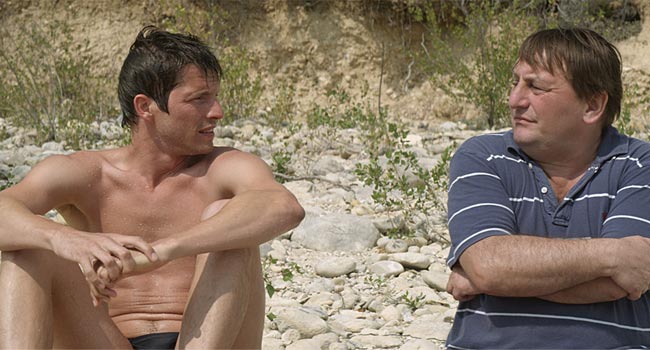
Suffused in sunlight yet layered with disquietude, this lingering mood piece is a high-watermark for the potential of arthouse movies to be both allegorical and frank.

Suffused in sunlight yet layered with disquietude, this lingering mood piece is a high-watermark for the potential of arthouse movies to be both allegorical and frank.
Never leaving the rural French lakeside setting on which it opens, Alain Guiraudie’s new film Stranger by the Lake (L’inconnu du lac) establishes an economy from its opening frame. In spite of the abundant sunlight and wide, cinematographic expanses (exceptionally lensed by Claire Mathon), there is an uneasy feeling of closure and confinement to the scene, achieved through an impeccable sense of composition, editorial timing, and with particular mention to the film’s densely layered, natural soundscape. Within moments Guiraudie has established the milieu: a secluded gay cruising spot; and the players, principally Franck (Pierre Delandonchamps), an unfazed and fit twenty-something who considers himself an infrequent visitor these parts of the lake, and Henri (Patrick d’Assumçao), a heavy divorcee content with staying clothed and dry, and not speaking unless spoken to. What is less clear—and let to unfold across the artfully modulated, ensuing hour-and-a-half—are Guiraudie’s stakes.
To establish these, Guiraudie purposefully employs a cinematic language that keeps its distance but nonetheless invites interpretation. Franck engages an intellectual and platonic friendship with Henri, whose return sentiments are stunted by his introverted nature, and then a physical relationship with Michel (Christophe Paou), whose forwardness and unpredictability suggest a direct link between sexual desire and the inexplicable. The filmmaking repeatedly engages these opposites—most prominently through these main characters—diving right in to ideas that should repel or negate each other, and dwelling within the pathological anxiety that naturally surfaces when these come together. I’ve already mentioned the seclusion and exposure of the setting, but Guaraudie’s chronicling of the frankly explicit sexual encounters of his players, over the course of a few weeks in summer, occupy the troubling space between love and a danger that’s both physical and emotional.

Guiraudie is first and foremost an imagist, and with Stranger By The Lake excels at storytelling without spoon feeding. His script is minimally composed with regard to dialogue; Guiraudie would prefer to hold a frame and pose an idea with a minute action than an overabundance of words. In this respect the film as a whole is offered a sense of uncluttered and immediate potency while scarcely feeling as if it’s trying—not a simple accomplishment. Its refined and pared-down parts make for a lingering and thoroughly engaging, shrewdly thrilling whole. Guiraudie’s closing shot is one that will long haunt anyone who sees it, where the literal and figurative darkness envelops our subjects, but in such a way that vision (or the knowing that is associated with light) is not discounted. It’s the clarity Maton finds in this barely moonlit scene, in that rare instance where digital camerawork offers an aesthetic advantage over film, that affords the finale its atmospheric power.
I think the bravura of Stranger By The Lake is finally in this defiantly committed embrace of metaphor, in a independent filmmaking typology that often shies away from direct allegory in a yearning for ‘arty’ credentials. Murder features in the film not merely as a narrative propeller, but a proxy for actual death and the complex perils of this subset of the homosexual lifestyle. Guiraudie has spoken of his characters as being splintered personas of the same man. It’s a provocative and beautiful way to assess Stranger By The Lake in hindsight, an occasion where the artist, precisely like his movie, says so much while saying so little.